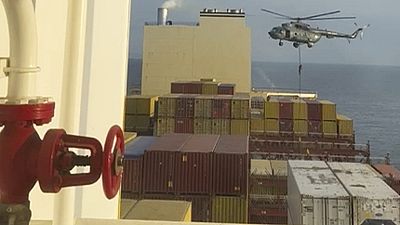By Alex Lawler
LONDON (Reuters) - A rise in China-bound exports of British oil may soften the potential blow to the sale of UK crude to Asia from a no-deal Brexit, export data showed and trade sources said, offsetting likely lower shipments to South Korea.
While Britain and the European Union remain in talks over Brexit, tariffs and other terms governing Britain's trade with most of the globe would be set under World Trade Organization rules under a no-deal departure from the EU.
The flow of British crude to Asia is significant for the global market as it can affect prices and is a popular trading play. Oil companies have been worried a no-deal Brexit could limit this arbitrage, creating excess supply in Europe.
According to UK government and oil trading sources, the flow of British crude to China would not face increased tariffs under a no-deal Brexit. China has in recent months been purchasing more than South Korea, the other major Asian buyer of UK oil.
"Leaving without a deal wouldn't impact the tariffs we face from China," a UK government source said, since Britain already trades with China under WTO rules.
This would go some way to leaving the arbitrage in Asia open for Forties, the most popular British crude grade among Asian buyers.
With the way forward still unclear, the UK's Department for International Trade said the government recommended planning for all Brexit outcomes, including no deal.
"Our priority is to avoid disruption to our global trading relationships as we leave the European Union and we are seeking continuity for existing free trade agreements," the department said in a statement.
'FEWER OPTIONS'
A trader with an oil company dealing in Forties said China would remain a viable outlet under a no-deal Brexit.
"Yes, I think it would," he said. "But I suppose looking at the overall picture, you would have fewer options for your barrels."
Flows to South Korea may decline, he said, since the UK would drop out of a free-trade agreement (FTA) the EU has with that country. With the FTA, South Korea became a big buyer of Forties, a trade that has helped support the grade's value.
Such shipments also affect global prices as Forties is part of the Brent benchmark used for oil deals. As a result, trading plays hinging on sending UK crude via tanker to the East, or appearing to do so, have become a popular feature of the market.
Oil companies that trade Forties are concerned its value could drop if South Korea imposes a customs tariff that matches pre-FTA levels should the UK leave the EU with no deal or without a separate trade agreement with Seoul.
"We worried about the impact it would have on Forties if the obvious arbitrage was not there any more," a second North Sea trading source said. "This would lower the value as there will be too much crude in the North Sea that needs to find a home."
Still, China has increasingly been providing that home, buying between 4 million and 6 million barrels of Forties a month since October, according to Refinitiv Eikon data.
Flows of Forties to Asia's biggest buyers: https://tmsnrt.rs/2TVvHeF
The economics of the trade hinge on a number of factors, such as freight rates and the competitiveness of a Brent-linked crude such as Forties against a more local crude grade based on the Dubai benchmark.
"Clearly the UK has found a ready market for this type of crude in China," Kpler, which researches oil trade patterns, said in a report.
"The flow of Forties into China is particularly interesting given the unusually long distance and shipment time."
(Editing by Dale Hudson)



